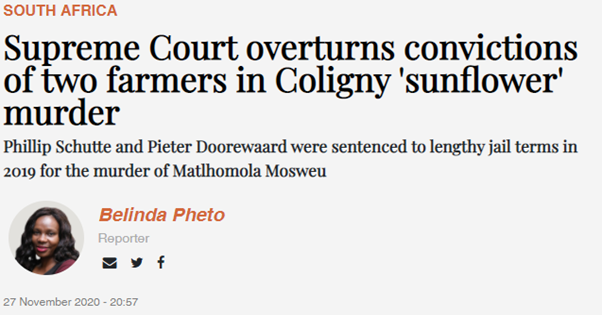Pieter Doorewaard and Philip Schutte were convicted for murdering Mathlamola Jonas Mosweu by the North West High Court in 2018. The Supreme Court of Appeal (SCA) has overturned that ruling, exonerating the accused. Friends of the IRR may not be surprised.
The tragic death of 15-year-old Motlamola Jonas Mosweu on 20 April 2018 was, many supposed, South Africa’s ‘George Floyd’ moment. On one side, a martyr; on the other, white racist murderers. In this view, the ‘Coligny Killer’ case was meant to be a message to all South Africans that at the end of the ‘rainbow nation’ was not a pot of gold for all to share but a pool of blood coagulating in the dust between a child and a sunflower-head, both snapped at the neck.
The narrative was set before investigation even began. But the fashionable verdict still needed a witness. Enter Bonakele Bendel Pakisi, a part-time butcher who said he saw Mosweu being murdered ‘with my two eyes’.
Pakisi said that he was then beaten, repeatedly, by Doorewaard and Schutte, forced to run over flying bullets, drink his own vomit repeatedly, and be otherwise intimidated before being knocked out on the day Mosweu died.
He said he was visited again thereafter, alternatively intimidated and offered bribes to keep his mouth shut. But in the name of justice, Pakisi came forward to bear witness against the ‘big fat bearded man’ and his accomplices, to the delight of those who wanted nothing more than to paint the rainbow red.
The town of Coligny was then looted, and subjected to arson, as protesters called for ‘justice’. Here is a look back at the damage. One ‘siener’ asked, in a piece worth reflecting on: ‘Coligny: Shape of things to come?‘
But Pakisi changed his version of events – given to the police before the fires started – and would go on to change them further before the North West High Court in the year to come. He said there were two perpetrators, then he said there were three; he said that he saw Mosweu thrown three times from the back of a bakkie, then that it was only once; he changed his version of where he was beaten, of the path that was taken, and of the timeframe of his ordeal, among many other points of fact.
Nevertheless, North West High Court judge Ronald Deon ‘Ronnie’ Hendriks found Pakisi’s evidence ‘honest, truthful and reliable’ and so sentenced Pieter Doorewaard and Philip Schutte to 18 and 23 years respectively on its basis.
‘Guaranteed’ more violence
The EFF wanted more, and why not? In 2018 the EFF won a Coligny by-election. Emboldened the week after its victory, EFF local head of elections Israel Monaise ‘guaranteed’ more violence if Doorewaard and Schutte were found ‘not guilty’.
‘If that can happen, Coligny will burn again. Our people are too angry over that case. That’s guaranteed,’ said Monaise.
But, after months of reading over a thousand pages of court transcripts and annexure evidence, much of it many times, I had my doubts about the ‘guilty’ verdict. Writing mentor Rian Malan, Politicsweb’s meticulous editor James Myburgh and I produced three pieces laying out these doubts: on Pakisi’s testimony, on the autopsy, and the cell-phone evidence, Doorewaard and Schutte’s conviction was open to doubt.
I further argued on Netwerk24 that these doubts were too substantial to deny Doorewaard and Schutte leave to appeal. But their appeal was denied by the North West High Court.
I had been extremely circumspect in my language until Judge Hendricks’ refusal even to grant appeal, which, based on the evidence, was ‘beyond comprehension’ and ‘scandalous‘, an argument that was picked up by Legal Brief. I further made the case on the Renegade Report, the Daily Friend Show, and Two Crickets in a Thorn Tree, and which was picked up by Biznews among others.
I made various submissions to bigger publications, all of which were rejected. Why, one must wonder?
After finding Doorewaard and Schutte guilty and denying them leave to appeal, Judge Hendricks was recommended for promotion to the position of North West Deputy Judge President by the Judicial Service Commission, chaired by Chief Justice Mogoeng Mogoeng, and appointed by President Ramaphosa in 2019. As News24 put it, ‘Third time lucky‘ for Judge Hendricks.
Not only did the most powerful agree that Judge Hendricks was among the best of the best, Doorewaard and Schutte were labelled ‘Coligny killers’ (without the technical ‘alleged’) long before their conviction in the North West High Court. The two spent 13 months in jail. Now the SCA turns all that on its head.
What is emerging in the news, now that ‘(both) accused are found not guilty and discharged’.
No surprise
‘’Black lives don’t matter in SA,’’ says family spokesperson of Coligny teen after acquittal’, reads one News24 headline. This response is no surprise. What is somewhat surprising is that the ‘family spokesperson’, identified only as ‘Mnyakama’ was approached and published in such a rush that he had not yet spoken to the family.

The Sunday Times headline says ‘two farmers’ were ‘involved in the murder’ though convictions have been overturned.

This is what the piece’s headline and subtitle look like on the Sunday Times’ own site. ‘Sunflower’ is qualified by quotation marks, but ‘murder’ is not. To borrow a phrase SCA Judge Aubrey Ledwaba uses to describe Judge Hendricks’s oversight of an ‘unexplained discrepancy’, that is ‘interesting’.
The introduction is even more ‘interesting’.

When Newzroom Afrika interviewed North West spokesperson of the NPA, Henry Mamothame, the question was put like this. ‘How are you responding then to this judgment today, essentially declaring the two farmers free?’
This phrase was not quite ‘exonerated’, ‘acquitted’ or ‘not guilty’, so much as simply ‘free’.
I actually like the interviewer’s technique in this case, for this was just a soft-ball question with a tough follow up … ‘as the NPA you still maintain that the testimony of [Pakisi] is accurate, it’s the truth, and can be relied on?’
Mamothame answered: ‘Of course we do. Remember the High Court in the North West gave a different judgment on this matter…’
Misreported
This was then misreported in the Sunday Times piece shown above, whose text incorrectly states that Mamothame ‘refused to be drawn on the legitimacy of the evidence given by [Pakisi]’.
As you can see for yourself on the video, Mamothame was eager to say ‘of course we do’ still consider Pakisi’s evidence legitimate but would not ‘be drawn on’ any counterarguments provided by AfriForum.
There are so many more little details to gripe about, like widespread misspellings of Mosweu’s name, widespread misattributions of his age at the time of his death, like News24’s (wrong) claim that the SCA is the ‘apex court’ among others, but it is important not to lose sight of the bigger picture.

Mosweu’s death might have been one of the countless, anonymous tragedies befalling South Africans every year which pass the EFF by. But so long as ‘our people’ can be rallied to crush what Pakisi might call ‘big fat white men’ on the strength of Mosweu’s death, his case merits the attention of Julius Malema as a ‘pinned tweet’.
The debacle is not over. The SCA had a split opinion on two substantial matters.
On the one hand, Judge Visvanathan Ponnan lays out a case against both the prosecutor and the North West High Court’s conduct. There ‘may well be an argument’, writes Judge Ponnan, of ‘material irregularity amounting to a failure of justice, but it [was] not necessary to arrive at a firm finding’ in the SCA ruling because all judges agreed to the verdict of ‘not guilty’.
If the matter continues further, however, the contention that Doorewaard and Schutte’s treatment amounted to a miscarriage of justice will be argued before the Constitutional Court.
On the other hand, Judge Mahube Betty Molemela found that Doorewaard and Schutte were guilty of ‘culpable homicide’ on the argument that even if Mosweu jumped, they would still be legally to blame.
Both arguments will be analyzed in the Daily Friend in the days to come. Thereafter they will, if the EFF sticks to its promise, go to the Constitutional Court.
Indispensable
For now, the final word must go to AfriForum, whose financial support of a legal team led by Barry Roux was indispensable.
It is not every day that an employee of the IRR acknowledges AfriForum’s work – and in the same week that Doorewaard and Schutte were found ‘not guilty’, Ernst Roets, deputy head of AfriForum, fired yet more critical tweets at the IRR. The youth might say Afriforum and the IRR seem to have ‘beef’.
I can only say in reply that without AfriForum two people would be sitting in jail for a crime they did not commit, on the basis of blatant lies, unquestioningly reported in the media, and weaponised by black nationalist politicians, to the detriment of them, Doorewaard and Schutte, and us all. AfriForum should be proud of its defence of the stigmatised this week.
The court of public opinion was so heavily stacked against Doorewaard and Schutte from their first public mention that finding evidence, analysing and communicating it, and sticking to the facts was never going to be easy.
AfriForum put the facts before the SCA with an impact both concrete and authoritative. AfriForum served not just its clients, here, but the South African public too.
If you like what you have just read, support the Daily Friend

